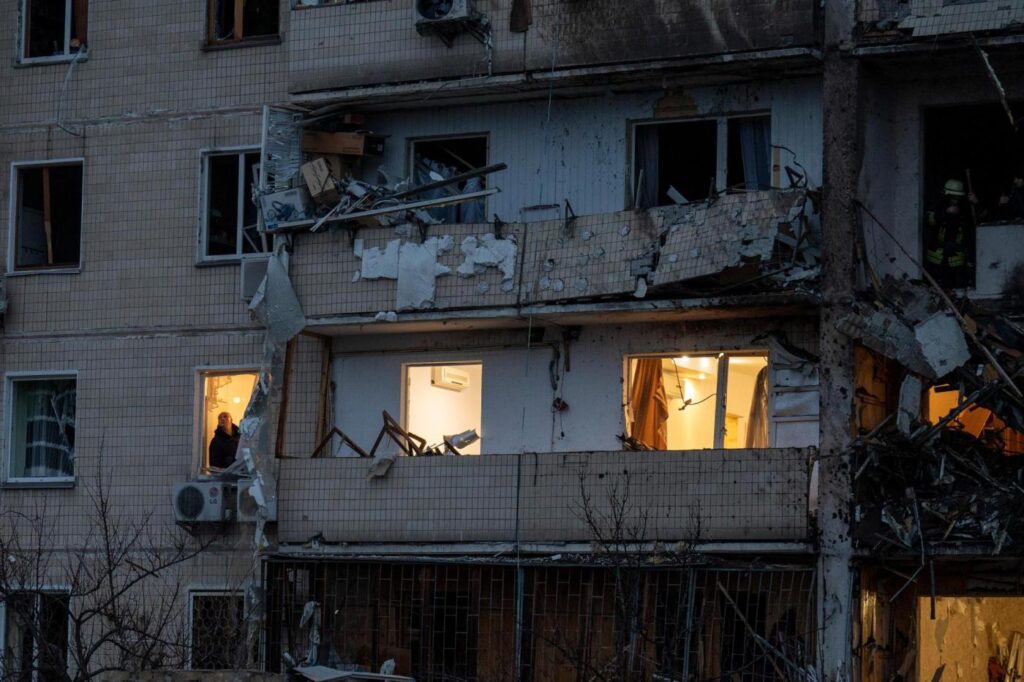
KYIV, Ukraine (AP) — Yurii Zhyhanov woke to his mother’s screaming and found himself covered in dust. On the second day of Russia’s invasion, shelling on the outskirts of Ukraine’s capital, Kyiv, struck their residential building before dawn.
Many civilians, horrified to find their lives at risk, started to flee during the attack’s first hours. Amid the smoke and the wailing of car alarms on Friday, Zhyhanov and his family packed and joined them.
“What are you doing? What is this?” he said, addressing Russia and gesturing to the damaged building behind him. “If you want to attack military personnel, attack military personnel. This is all I can say.”
His weariness and shock reflected that of his country as people climbed out of bomb shelters, basements and subways to face another day of upheaval.
Those who didn’t wake to explosions were roused by air raid sirens. Then came the news that Russian forces had advanced to the capital’s outskirts.
Russia has said it is not targeting cities, but the fighting seemed far too close.
The body of a dead soldier lay on the ground near a Kyiv underpass. Elsewhere, fragments of a downed aircraft smoked in a residential area. Black plastic was draped over body parts found amid the brick homes.
Armored personnel carriers drove down the city’s streets. Soldiers on empty bridges established defensive positions. Residents stood uneasily in doorways of apartment buildings, watching.
Outside a monastery, a woman lifted her hands toward a mural of saints and appeared to pray. In the port city of Mariupol, a young girl named Vlada wished for the assault to stop.
“I don’t want to die,” she said. “I want all of this to end as soon as possible.”
Uncertainty compounded the fear. On a street in the Obolon district, Associated Press journalists saw a military truck disabled, its tires deflated. The truck had no apparent insignia, and it was not clear if it was a vehicle that Ukraine’s general staff claimed had been stolen by Russian forces aiming to disguise themselves as local ones.
Ukrainians picked through the damage left by shelling. And some mourned.
In the city of Horlivka, in the territory held by pro-Russian rebels, a body covered with a blanket lay on the ground outside a house that had been hit. A man standing nearby spoke on the phone.
“Yes, Mom’s gone, that’s all,” he said. “That’s it, Mom’s gone.”
The U.N. human rights office said it was receiving increasing reports of civilian casualties, with at least 25 deaths verified, mostly from shelling and airstrikes. “The figures, we fear, could be much higher,” agency spokeswoman Ravina Shamdasani said.
The urge to run away grew. Some approached borders on foot, wheeling luggage behind them. “It’s unfortunate that we got here in our old age, facing a war,” said Marika Sipos, who had left her home in Koson. She wiped her eyes.
At a train station just across the border in Poland, hundreds of people from Ukraine sought shelter. Some curled up on cots, trying to sleep. A woman stroked the hair of a young girl.
One of those at the station was Andry Borysov, who said he had heard the rush of something flying overhead and then an explosion as he hurried to catch a train out of Kyiv.
“It was an unmistakable sound,” he said.
Some hesitated to leave Ukraine, even as they stood on railway platforms.
In Kostiantynivka, a government-controlled area in the separatist-held Donetsk People’s Republic, a woman who gave only her first name, Yelena, appeared undecided.
“It’s 50-50 on whether it is worth leaving or not,” she said. “But it wouldn’t hurt to leave for a couple days, for a weekend.”
Others leaving Ukraine knew it might take much longer before they could return home.
___
Follow AP’s coverage of the Ukraine crisis at https://apnews.com/hub/russia-ukraine
